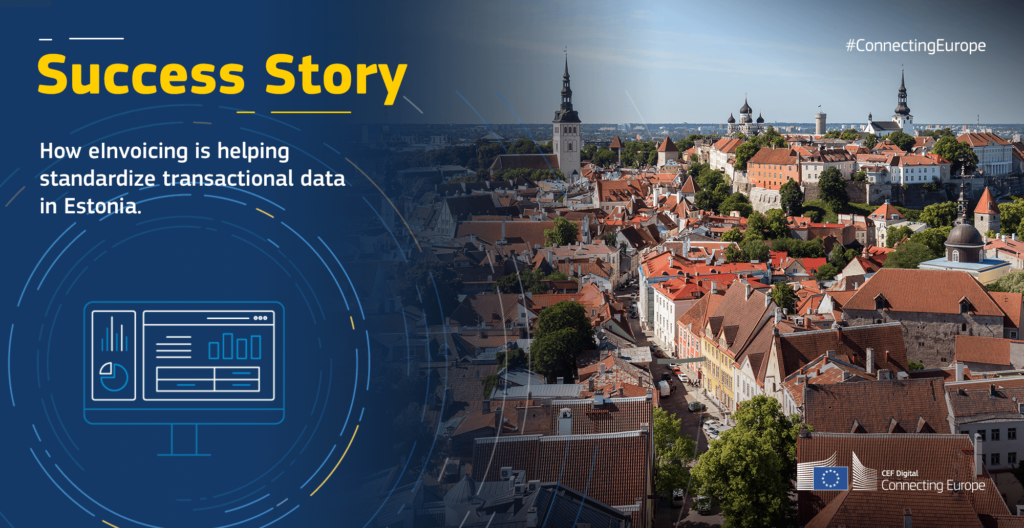How elnvoicing is helping standardize transactional data in Estonia
Source: https://ec.europa.eu/
Running a business can be daunting. In addition to everyday obligations, there are also complex accounting responsibilities involving many time-consuming administrative tasks.

According to a 2010 study carried out by the European Commission, adopting electronic invoices (eInvoices) could save the EU economy some EUR 240 billion over a six-year period. The Commission provides public administrations, service providers, and businesses with advice on eInvoicing related projects to facilitate this transition. This support is based on the lessons learned and challenges faced in B2G (Business to Government) eInvoicing and the eInvoicing Directive implementation.
Internet of Business Project: standardizing financial transaction information
In Estonia, the ”Internet of Business” projectaims to develop a secure and standardized network based on the real-time economy concept, in which business transactions are digital and completed instantaneously. The Connecting Europe Facility’s (CEF) eInvoicing Building Blockactively supports the Estonian stakeholders in conducting this project. The project meets the European Commission eInvoicing Directive 2014/55/EU objectives and enables secure processing of national and cross-border transactions between public administrations and private entities. The project is comprised of the following partners:
- MTÜ ITL Digital
- Tieto Estonia AS
- Unifiedpost AS
- Columbus Eesti AS
- BCS Itera AS
- Account Studio OÜ
- SimplBooks OÜ
- OÜ Skriining
- Association of Estonian Accountants
The lead partner is the NGO ITL Digital Lab, an Estonian non-profit which brings together Information and Communication Technology (ICT) companies.
One of the Estonian entrepreneurs’ main problems when dealing with government institutions is the duplication of companies’ obligations when reporting information.
”With the help of the Connecting Europe Facility (CEF), we built a middleware that allows accounting software to freely standardise the input for governmental institutions information systems, helping society as whole to deal with this issue,” Margus Tammeraja, Chairperson of Accountants Estonia, told CEF. ”So far, tax authorities have been having those point-to-point connections with all the different accounting software, which is cumbersome.”
LEARN MORE ABOUT EINVOICING
Main activities
The ”Internet of Business” project is based on the XBRL GL standard for financial transactional data. The middleware created in the project context helps to adapt software and service providers’ systems and maps them according to the European standard on eInvoicing. The recently developed ’MyCompanyData’ service allows the submission of monthly tax reports in XBRL GL format. Future developments of ”MyCompanyData” should enable service providers to read transactional data stored in other service providers’ systems, improving data exchanges and interoperability among systems. This marks a significant step towards the real-time economy.
Project partners ran an XBRL GL standard pre-analysis. They mapped it against transactional data in the tax reports while considering the results and concepts of previous projects and observing the possibilities of using innovative technologies information exchange.
Overall, the project resulted in a technical description document with instructional materials reused in Estonia and other EU countries where XBRL GL and EU legislation are used or foreseen.
This initiative is aligned with the European Commission Directive 2014/55/EU requirements and enables secure national and cross-border transactions between the public and private sectors.
”With this project, we wanted to give more time for entrepreneurs to spend resources on their core business, instead of having to deal with administrative tasks,” Sirli Heinsoo, Internet of Business project manager, told CEF.
Challenges faced and the support provided by the CEF eInvoicing Building Block
eInvoicing is a digital solution that enables public sector contracting authorities and companies to receive and process electronic invoices, according to the European standard on eInvoicing. In addition to facilitating the synergies and interoperability between the private and public sectors, eInvoicing reduces costs and administrative burden. The timely and automatic processing of companies’ invoices in the EU facilitates cross-border trade, making commercial exchanges easier within the internal market.
One problem faced by the ”Internet of Business” project was that the eInvoicing standard is not yet implemented in all accounting IT programs, even though they still follow European legislation.
Due to this limited offer of ”ready to use” eInvoicing solutions for businesses, the creation of structured eInvoices according to European standards requires additional work for companies to make electronic invoices compliant and ready to be sent across borders.
”Instead of making it mandatory for this accounting software system to comply with the European standard, we decided to go a little deeper on the data level and use only one standard system,” Ms. Heinsoo told CEF.
Ultimately, it all comes down to the principles of the EU’s digital economy: interoperability, re-usability, and the ”once-only principle.” The eInvoicing Building Block not only facilitates transactions between the public and private sector, but it can also bring tremendous benefitsto businesses and citizens.
”If the companies reduce their administrative burden, they can focus more on the their core business and clients,” said Mr. Tammeraja. ”If you focus more on your core business, the quality of the service goes up, and clients are more pleased.
How can CEF help you?
At the Connecting Europe Facility, we give you access to free tools, support, and funding to build your digital services. Here are some of the other Building Blocks you might be interested in.
Supports EU-wide cross-border public services using blockchain technology
BLOCKCHAIN (EBSI)
Facilitates the preservation, migration, reuse, and trust of your information
EARCHIVING
Exchanges data and documents securely and reliably.